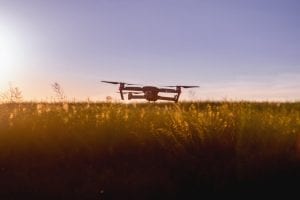We live in a world that’s high-paced. Change is a daily occurrence and the workplace is continuously evolving. Agriculture is no exception. So how do current students perceive the future of agriculture and validate their choice of degree for the success of their careers?
Agriculture can be perceived as an expanding industry with many challenges to combat including technology adoption, maintaining social license and feeding the growing world. The reality is that the current generation will be solving these challenges, requiring educated minds with a diverse knowledge pool and a willingness to succeed. It is with this perspective that I propose the future of work for agricultural professionals to be vibrant.
With the rise of technology it may be expected that our jobs will eventually be replaced by machines and perhaps this is the reality to an extent.
Considering manual labour roles are becoming harder to fill, coupled with the increase in workplace safety compliance, increases in wages assigned to these roles and declining terms of trade, it is evidently becoming more economical in large-scale operations to replace some labour units with technology capable of the task at hand.
So what kind of work can educated students expect? Technology development has focused on increasing on-farm efficiencies, however there are still some big issues to combat in this sphere. I’m sure we are all waiting on that next invention or discovery that revolutionises how we shear sheep, transport livestock, eradicate disease or deal with Australia’s water constraint. Such work ultimately requires professionals with background and understanding of the industry-wide issues. It is here where we need these educated agriculturalists with a systems viewpoint to guide and undertake scientific research in order to best provide solutions.
Although technologies aim at improving on-farm efficiencies by reducing labour costs, they still require operators and interpreters for maximum benefit.
Many scientific based management tools have been developed to aid managers in their decision making and some may depict such tools as superior to in-depth education. However inputting data and interpretation of results are not unbiased. For optimal success managers require an understanding of the whole system to balance trade-offs associated with production. Have you ever come across a production system, paddock or breeding program that is completely uniform and able to be perfectly aligned to developed models to give entirely accurate results? Inevitably at the heart of an effective management system is an educated professional with a systems thinking approach, armed with an understanding of the limitations of the developed tools and the ability to manage the trade-offs in a risk effective manner. Again this is where a skilled graduate can thrive.
Considering we face unknown markets, we can only predict what will drive these markets in the future and what our consumers will demand. Fundamentally we tailor our production to fit the market, so we must remain adaptive. Such adaptiveness is evident today with the growing trend of incorporating value-addition and vertical integration. Ultimately the success of many agricultural businesses is currently relying on their ability to interconnect industries and maintain competitive advantages. This obviously requires diverse knowledge pools for businesses to prosper and is another emerging source of employment for upskilled agricultural professionals.
What is one of the greatest threats to the future of agriculture? The power of social license is considerably under emphasised and essentially a limiting factor in the evolution of agriculture. It is a priority the industry needs to take the reins on and lead into the future. Rising concerns of consumers has forced the industry to address its social license, and technology will be an important vector for maintaining social license through education.
Increasing virtual reality technology to convey on-farm practices has the potential to bridge the knowledge gap of the public and allow agriculture to succeed into the future. Such emerging facets within agriculture will require professionals skilled in marketing, education, as well as agricultural production.
What else could altering social license achieve? We are all aware of the industrial revolution, the green revolution and it may be perceived that we are in the technological revolution, but what will be next? Perhaps it will be the genetic revolution and through the acceptance of genetic modification we will be able to break yield ceilings and exponentially increase the efficiency of agricultural production. Again this can of worms, if opened, will support many upskilled graduates.
Ultimately in this technological age there is growing concern over the future of the agricultural workforce. However the main aspect of human skill unable to be replicated by technology is creativity and there will always be a market for the creativity flare people possess. Creativity is how all the advancements in our world have come about in the first place isn’t it?
I for one am excited to be a part of the future solutions and evolution of agriculture and content that my degree with UNE equips me with a broad knowledge and skill set enabling me to be appreciative of the inter-connectedness of the agribusiness world.
 Jazmine Hobbs is an external student studying a Bachelor of Agribusiness, majoring in Rural Science. Her passion for agriculture is within the wool industry and on an average day you will find her busy out the paddock with the sheep on the property where she works in Bendemeer.
Jazmine Hobbs is an external student studying a Bachelor of Agribusiness, majoring in Rural Science. Her passion for agriculture is within the wool industry and on an average day you will find her busy out the paddock with the sheep on the property where she works in Bendemeer.
She intends on completing post-graduate study and working with producers to bridge the gap between scientific research and commercial adoption.
Jazmine is excited to be apart of the future of agriculture, aspiring to make her mark within the industry.




Recent Comments